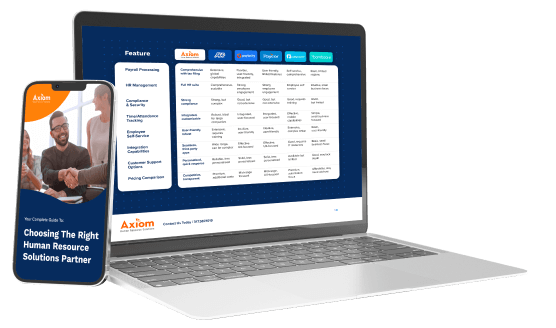
Hybrid work has transformed the modern workplace—but it’s also introduced a new challenge: incivility.
As companies strive to blend in-person and remote collaboration, many HR leaders are encountering increased tension, miscommunication, and disengagement. These subtle frictions often fall under a broader category known as workplace incivility—a low-grade but persistent threat to culture, morale, and retention.
At Axiom HRS, we work with companies to build stronger, more resilient team dynamics. In hybrid environments, that means being proactive about setting expectations, creating trust, and responding quickly to signs of conflict. Here’s what your HR strategy needs to include to prevent toxic behavior from undermining performance.
What Is Workplace Incivility?
Workplace incivility refers to low-intensity, disrespectful behavior that violates norms of mutual respect. It’s not outright harassment or aggression—it’s the cold shoulder in a Zoom meeting, the passive-aggressive comment, the email that leaves out a key team member.
In hybrid teams, these behaviors are harder to spot and easier to excuse. But left unchecked, they create a culture of avoidance and disengagement. Remote workers, especially, may feel excluded or overlooked, while on-site employees may misinterpret lack of response as lack of effort.
Why Hybrid Work Amplifies Conflict
While hybrid work offers flexibility, it can also fragment communication and culture. Here’s how that plays out:
- Asymmetrical Visibility: In-person workers have more access to managers, creating unintentional favoritism.
- Delayed Feedback Loops: Slack threads and email chains can easily escalate misunderstandings.
- Unclear Boundaries: With blurred lines between “home” and “work,” tone and timing become even more important.
- Missed Context: Virtual-only interactions strip away nonverbal cues, leaving room for misinterpretation.
This isn’t just a productivity issue—it’s a retention risk. Research shows that uncivil environments significantly increase turnover and diminish employee commitment.
5 HR Strategies to Prevent Incivility in Hybrid Teams
Preventing workplace incivility doesn’t require massive policy overhauls. It requires intentional leadership, clear expectations, and responsive communication protocols. Here are five practical steps HR leaders can take:1. Define Behavioral Expectations—Explicitly
1. Define Behavioral Expectations—Explicitly
Assumptions breed conflict. That’s why hybrid teams need clearly documented behavioral norms:
- How do we handle delayed responses?
- What’s the expectation for camera-on participation?
- How do we address disagreements respectfully—online or off?
Codifying these expectations in your employee handbook or hybrid work policy gives teams a shared language for addressing gray areas.
2. Train Managers to Spot Hybrid-Specific Red Flags
In traditional offices, managers could observe interpersonal dynamics in real time. In hybrid setups, HR must equip managers with new techniques to spot incivility remotely.
Training should include:
- Recognizing exclusion patterns (e.g., “meeting after the meeting” culture)
- Watching for tone issues in Slack/email
- Monitoring uneven speaking time in virtual meetings
Managers are your frontline defenders of a healthy virtual team culture—they need both the authority and the skills to intervene early.
3. Create Consistent, Inclusive Communication Protocols
Preventing remote team communication issues starts with designing intentional, inclusive rhythms:
- Use meeting agendas that rotate ownership across remote and on-site staff
- Centralize updates in shared digital spaces to avoid side-channel bias
- Schedule cross-location check-ins that prioritize equity of voice
When communication is structured, shared, and repeatable, it reduces unspoken tension and levels the playing field.4. Offer Confidential Feedback Channels
4. Offer Confidential Feedback Channels
Employees are more likely to report incivility when they feel safe doing so. A confidential feedback channel—whether digital or in-person—allows HR to monitor the team’s emotional health and identify patterns of hybrid work conflict before they escalate.
Consider quarterly culture pulse surveys that specifically ask about inclusion, communication, and respect across remote/in-person divides.
5. Reward Respect and Empathy
What gets recognized gets repeated. If you want to reduce toxic behavior, actively highlight and reward positive interpersonal contributions:
- Praise moments of cross-location collaboration
- Celebrate inclusive behavior in public forums
- Tie values-aligned behavior to performance recognition
Empathy isn’t soft—it’s a strategic asset in hybrid work environments. Build it into your culture by celebrating it when it shows up.Culture Is Everyone’s Job
Culture Is Everyone’s Job
Workplace incivility doesn’t fix itself. And in hybrid environments, it can quietly grow until it fractures collaboration completely.
Axiom HRS helps organizations build sustainable, people-first strategies to keep hybrid teams healthy, communicative, and productive. With the right structure, your organization can prevent small slights from turning into big problems—and turn your hybrid model into a competitive advantage.
Can AI tools replace HR professionals in compensation planning?
No. While AI can support decision-making through automation and analysis, compensation requires human oversight to ensure fairness, legal compliance, and alignment with company values.
Workplace Incivility FAQs
What is workplace incivility?
Workplace incivility refers to low-level disrespectful behavior that violates norms of politeness or inclusion—such as dismissive remarks, interruptions, or exclusion from communications. It may not break formal rules but erodes team trust and morale.
Why is workplace incivility more common in hybrid teams?
Hybrid work often amplifies incivility due to communication breakdowns, unequal visibility, and the loss of social cues. Remote workers may feel excluded or misunderstood, while in-person workers may perceive disengagement.
How can HR address remote team communication issues?
HR can reduce communication issues by establishing clear protocols, rotating responsibilities, offering feedback channels, and training managers to lead inclusive virtual meetings.
What are signs of hybrid work conflict?
Look for signs like passive-aggressive messaging, cliques forming between in-person workers, lack of participation from remote staff, or inconsistent feedback loops.
How can Axiom HRS help?
Axiom HRS supports clients with tailored hybrid work policies, manager training, confidential culture surveys, and people-first conflict resolution frameworks.



